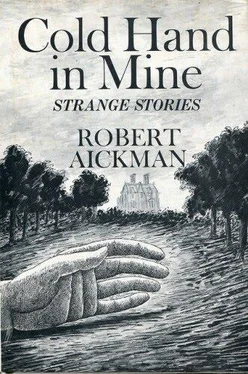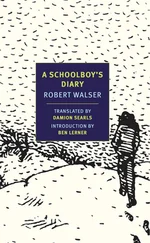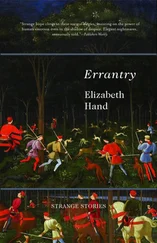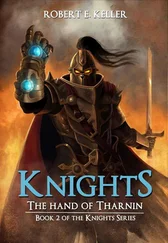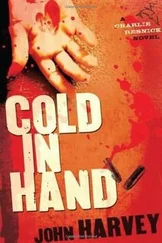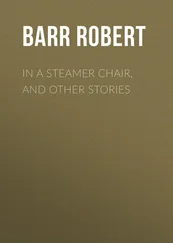Our little talk on the subject came at the end of a week — at least a week — when we had hardly spoken together at all, let alone done anything else. Ursula was all a dirty white colour; her hair was now so streaked and flecked that everyone would notice it at once; and she was plainly losing weight. She had given up any attempt to look pretty, about which previously she had been so careful, so that I loved her for it. And, as I say, she hardly let fall a word, do what I would. Evening after evening, we just sat hopelessly together listening to the clocks striking all over the house.
Ursula had always had much the same attitude to doctors as mine, which was yet another reason why I loved her. But now that made it difficult to press her on the subject.
She simply said "No," smiled a little, and shook her pretty head. Yes, a pretty head it still was for me, despite changes.
I put my arms round her and kissed her. I knelt at her feet, wept in her lap, and implored her. She still said "No, no," but no longer smiling, no longer moving at all.
So I thought the best thing — the only thing — was to visit Tweed myself.
Of course, it did no good. Tweed simply took his stand upon the official line that he could say nothing without first "examining the patient" herself. When I repeated that she refused to be "examined" (and, truly, I found it hard to criticize her attitude), he actually said with a smile, "Then, Joe, I suspect that she's not really very ill." Tweed calls me Joe, though I call him Doctor Tweed. Of course he is considerably older than I am, and I've known him since I was a boy. I should find it difficult to speak the same language as these new young doctors. I come between the generations, as it were.
I tried to remonstrate. "After all, I am her husband," I cried, "and I'm very worried about her."
"I could examine you " said Tweed, fixing me with his eye, only half-humorously.
Obviously it was out of the question even to attempt a description of the strange and oppressive background to it all.
"She's in the grip of some outside power, and it's nearly killing her," I cried. It was all I could get out, and of course it sounded ludicrous.
"Now, Joe," said Tweed, professionally conciliating, but firmly silencing me all the same. "Now, Joe. You make me think that I ought to examine you. But I've a better idea. Suppose I make a joint appointment for the two of you, so that I can examine you both?b I'm sure your wife will agree to that."
"She won't," I said, like a stubborn schoolboy.
"Oh, you husbands! Have you no authority left? Joe, I'm ashamed of you."
And I think there was a bit more between the two of us along the same lines, but I know that Tweed ended by saying: "Now, of course, I'll see your wife. Indeed, I'd like to, Joe, You might tell her that. Then just ring for an appointment almost any day, except Tuesday or Friday."
As I drove away, the idea occurred to me of consulting a quack, a proper quack — one of those people who are not on the medical register, and of whom in every company there are always some who speak so highly.
Then I thought that a consultation with a priest might be another possibility.
So as I wove my way home in the car, I was meditating — though fretting might be a better word — upon which priest or parson I could consult. The difficulty was, of course, that Ursula and I belonged to different faiths, Pope John or no Pope John; and that I had always been excluded from Ursula's creed as fully as from her life with the clocks and their overseer. Moreover, as far as I could see, she had largely allowed the matter to lapse for some considerable time. Ursula's official faith was probably most incompatible with that other preoccupation of hers. And, what is more, I myself was on little more than affable nodding terms with our Church of England vicar. I subscribed to things, and I had a regular classified advertisement in the monthly parish magazine, but that was about all. A home where the religions are mixed always presents problems. And, finally, I could not see an appeal to Ursula to confide in her confessor as likely to achieve more than my appeal to her to confide in Tweed. Ursula was locked up within herself, and the key had either been thrown away or entrusted to one who no longer seemed to be visiting us.
Far from easing my mind in any way, my interview with Tweed had applied a new twist to my torture, and soon my last and desperate expedient of resorting to a priest had begun to seem hopeless. I had so little knowledge of what a priest could be expected to do, even, as it were, at the best. By the time I reached home, I was so wrought up as to be quite unfit for driving. Though I never, if I can help it, go more than steadily, I had by then no right, properly speaking, to be on the road at all.
I noticed as I chugged past the clock outside the new multiple store (it is a polygonal clock with letters making a slogan instead of figures), that it was past three o'clock, even though I had not stopped for any kind of lunch. My idea was that I would look in on Ursula fairly quickly, and then make tracks for my neglected office. Ursula knew that I had been to see Tweed, so that something would have to be invented.
Ursula no longer seemed to appreciate the little ceremony of opening the front door to me, so nowadays I used my own key. As soon as I had opened the door that afternoon, the first indication of chaos lay spread before me.
In the hallway had stood, since Ursula and her friend put it there, a tall clock so bedizened and twisted with carved brown woodwork as to have lost all definable outline or shape. Now this object had been toppled, so that its parts and guts were strewn across the hallway floor. I hurriedly shut the outer door, but then stood for several moments taking in the details of the ruin. The entire head of the clock, containing the main part of the mechanism and the dial, had almost broken away from the rest, so that the effect was as if the clock had been strangled. And all over the hallway mat were disgusting pink and yellow pieces from its inside that I knew nothing of.
It was a revolting sight as well as an alarming one and, tense as I had been before even entering the house, I was very nearly sick. But I took a final pull on myself and plunged into the living-room, of which the door from the hallway was already open.
This time there was devastation of another kind: all the clocks had disappeared.
That morning, the last time I had been in the room, there had been no fewer than six of them, and had I not often counted them — in that particular room, at least? Now there were only marks on the wallpaper, faint shadows of all the different heights and breadths — except that, even more mysteriously, there were a few mechanical parts, quite obviously clock parts, scattered across the roses in the carpet. I think they are roses, but I am no botanist.
I gingerly picked up one or two of the scattered bits, small springs and plates and ratchets, and I stood there examining them as they lay in my hand. Then I shouted out "Ursula, Ursula, Ursula," at the top of my bawl.
There was no response from Ursula, nor in my heart had I expected one. But my shouting instantly brought into action Mrs Webber, Mrs Brightside, and Mrs Delft, who had undoubtedly been keenly awaiting some such development. They are three of our neighbours: one each from the houses on either side, and the third from the house immediately opposite. I had been grimly aware for a long time that events in our home must have given them much to talk about and think about. Now they were all three at my front door.
I cannot hope to separate out their mingled narratives.
During the dinner time hour that day, a black van had stopped at our gate. All the ladies were most emphatic about the size of the van: "bigger than an ordinary pantechnicon," one of them went so far as to claim, and the other two agreed with her on the instant. But into this vast vehicle went from my abode only clocks — as far as the ladies could observe; but clock after clock after clock; until the ladies could only disbelieve their eyes. Ursula had done most of the carrying, they said, and "a great struggle" it had been; while the man who came with the van merely stood by, to the growing indignation of my three informants. But then came the heavier pieces, the grandfathers and chiming colossi, and at that point the man did deign to lend a hand, indeed seemed perfectly capable of mastering the huge objects all by himself, entirely alone, without noticeable effort. "He was a great big fellow," said one of the ladies. "As big as his van," agreed another, more awed than facetious.
Читать дальше
